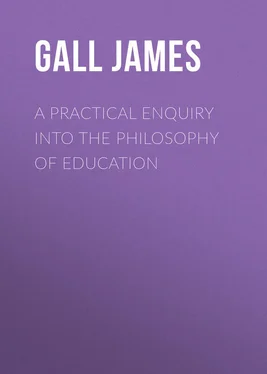James Gall - A Practical Enquiry into the Philosophy of Education
Здесь есть возможность читать онлайн «James Gall - A Practical Enquiry into the Philosophy of Education» — ознакомительный отрывок электронной книги совершенно бесплатно, а после прочтения отрывка купить полную версию. В некоторых случаях можно слушать аудио, скачать через торрент в формате fb2 и присутствует краткое содержание. Жанр: foreign_detective, foreign_antique, foreign_prose, на английском языке. Описание произведения, (предисловие) а так же отзывы посетителей доступны на портале библиотеки ЛибКат.
- Название:A Practical Enquiry into the Philosophy of Education
- Автор:
- Жанр:
- Год:неизвестен
- ISBN:нет данных
- Рейтинг книги:3 / 5. Голосов: 1
-
Избранное:Добавить в избранное
- Отзывы:
-
Ваша оценка:
- 60
- 1
- 2
- 3
- 4
- 5
A Practical Enquiry into the Philosophy of Education: краткое содержание, описание и аннотация
Предлагаем к чтению аннотацию, описание, краткое содержание или предисловие (зависит от того, что написал сам автор книги «A Practical Enquiry into the Philosophy of Education»). Если вы не нашли необходимую информацию о книге — напишите в комментариях, мы постараемся отыскать её.
A Practical Enquiry into the Philosophy of Education — читать онлайн ознакомительный отрывок
Ниже представлен текст книги, разбитый по страницам. Система сохранения места последней прочитанной страницы, позволяет с удобством читать онлайн бесплатно книгу «A Practical Enquiry into the Philosophy of Education», без необходимости каждый раз заново искать на чём Вы остановились. Поставьте закладку, и сможете в любой момент перейти на страницу, на которой закончили чтение.
Интервал:
Закладка:
Here then we have the highway of education, marked off, and walled in by Nature herself. That these four great departments in her educational process will be much better defined, and their parts better understood, when experience has given more ample opportunities for their observation, cannot be doubted; and it is not improbable, that future investigations will suggest a different arrangement of heads, and a different modification of their parts also; but still, the great outline of the whole, we think, is so distinctly marked, that, so far as they go, there can be little mistake; and by following them, we are most likely to obtain a large amount of those benefits which education is intended to secure. – To excel Nature is impossible; but by endeavouring to imitate her, we may at least approach nearer to her perfections.
It is not enough, however, for us to perceive the great outlines of Nature's operations in education; we must endeavour to follow her into the details, and investigate the means which she employs for carrying them into practical effect. We shall therefore take up the several departments above enumerated in their order, and endeavour to trace the laws which regulate her operations in each, for the purpose of assisting the teacher in his attempts to imitate them.
CHAP. II
On the Method employed by Nature for cultivating the Powers of the Mind
The first step in Nature's educational process, is the cultivation of the powers of the mind; and, without entering into the recesses of metaphysics, we would here only recall to the recollection of the reader, that the mind, so far as we yet know, can be cultivated in no other way than by voluntary exercise: – not by mere sensation, or perception, nor by the involuntary flow of thought which is ever passing through the mind; but by the active mental operation called "thinking," – the voluntary exertion of the powers of the mind upon the idea presented to it, and which we have denominated "reiteration," 1 1 Note A.
as perhaps best descriptive of that thinking of the presented idea "over again," by which alone, as we shall see, the mind is cultivated, and knowledge increased.
It is also here worthy of remark, that the cultivation of the powers of her pupil's mind, as a preliminary to their acquiring and applying of knowledge, appears to be a settled arrangement of Nature, and one which must be rigidly followed by the teacher, wherever success is to be hoped for. Analogy, in other departments of Nature's operations, proves its necessity, and points out its wisdom; for she is never premature, and never stimulates her pupils to any work, till they have been properly prepared for accomplishing it. Hence the consistency and importance of commencing the process of education, by expanding and cultivating the powers of the mind, preparatory to the future exertions of the pupil; and hence also the wisdom of requiring no more from the child, than the state of his mental powers at the time are capable of performing. Our object, at present, is to discover the means employed by Nature for accomplishing this preliminary object, that we may, by imitating her plans, obtain the greatest amount of benefit.
In infancy, and during the early part of a child's life, each of the thousands of objects and actions which are presented to its observation, falls equally on the organs of sense, and each of them might , if the child had pleased, have become objects of perception, as well as objects of sensation. But it is evident, that till the mind occupy itself upon one or more of these objects, there can be no mental exercise, and, of course, no mental culture. On the contrary, if the mind shall single out any one object from the mass that surrounds it, – shall entertain the idea suggested by its impression on the organs of sense, and think of it – that is, review it on the mind – there is then mental exercise, and, in consequence, mental cultivation. From this obvious truth it necessarily follows, that the cultivation of the mind does not depend upon the multitude of objects presented to the observation of a child, but only on those which it really does observe, – which it looks at, and thinks upon, by an active voluntary exercise of its own powers. The child, no doubt, might have smelt every odour; it might have listened to every sound that entered the ear; and it might have looked upon every image that entered the eye; but we know that it did not. A few of them only were thought of, – the ideas which they suggested were alone "reiterated" by the mind, – and therefore they, and they alone, tended to its cultivation.
As this act of the mind lies at the root of all mental improvement, during every stage of the pupil's education, it becomes a matter of considerable importance, that its nature, and mode of operation, should be thoroughly understood.
Let us for this purpose suppose that a lighted candle is suddenly presented before a young infant. He looks at it; he thinks of it; his mind is employed with the flame of the candle in a manner quite different from what it is upon any thing else in the room. All the other images which enter the eye fail to make an impression upon the mind; but this object which the child looks at, – observes, – does this; and accordingly, while it is passive as to every thing else, the mind is found to be actively engaged with the candle. He not only sees it, but he looks at it. This, and similar "reiterations" of ideas by the mind, frequently repeated by the infant, gradually communicate to it a consciousness of mental power, and enable him more and more easily to wield it. Every such instance of the reiteration of an idea, – of the voluntarily exercise of active thought, – strengthens the powers of the mind, so that he is soon able to look at and follow with his eyes other objects, although they are much less conspicuous than the glare of a candle.
When we examine the matter a little farther in regard to infants, we perceive, that all the little arts used by the mother or the nurse, to "amuse the child," as it is called, are nothing more than means employed to excite this reiteration of ideas by the mind. A toy, for example, is presented to the infant, and his attention is fixed upon it. He is not satisfied with passively seeing the toy, as he sees all the other objects in the room, but he actively looks at it. Nor is this enough; the toy is usually seized, handled, mouthed, and turned; and each movement prompts the mind to active thought, – to reiterate the idea which each of the sensations suggests. These impressions are no doubt rapid, but they are real; and each of them has been reiterated, – actively thought of, – before they could either be received, or remembered; and it is only by these impressions frequently repeated, in which the mind is vigorously and delightfully engaged, that it acquires that activity and strength which we so frequently witness in the young.
At a more advanced period during childhood and youth, we find the cultivation of the mind still depending upon the same principle. It is not enough that numerous objects be presented to the senses of the pupil; or that numerous words or sounds be made to vibrate in his ears; or even that he himself be made mechanically to utter them. This may be done, and yet the mind may remain perfectly inactive with respect to them all: – Nay, experience shews, that during such mechanical exercises, his mind may all the time be actively employed upon something else. There must therefore, not only be a hearing, or a reading of the words which convey an idea, but he must make the idea his own, by thinking it over again for himself. Hence it is that mental vigour is not acquired in proportion to the number of pages that the pupil is compelled to read; nor to the length of the discourses which are delivered in his hearing; nor to the multiplicity of objects placed before him. It is found entirely to depend upon his diligence in thinking for himself; – in reiterating in his own mind the ideas which he hears, or reads, or which are suggested to his mind by outward objects. This is still the same act of the mind which we have described in the infant, with this very important difference, however, that a large portion of his ideas is now suggested by words , instead of things ; but it is the ideas, and not the words, that the mind lays hold of, and by which its powers are cultivated. When this act therefore is successfully forced upon a child in any of his school operations, the mind will be disciplined and improved; – but wherever it is not produced, however plausible or powerful the exercise may appear to be, it will on scrutiny be found to be totally worthless in education, – a mere mechanical operation, in which, there being no mental exertion, there can be no mental culture.
Читать дальшеИнтервал:
Закладка:
Похожие книги на «A Practical Enquiry into the Philosophy of Education»
Представляем Вашему вниманию похожие книги на «A Practical Enquiry into the Philosophy of Education» списком для выбора. Мы отобрали схожую по названию и смыслу литературу в надежде предоставить читателям больше вариантов отыскать новые, интересные, ещё непрочитанные произведения.
Обсуждение, отзывы о книге «A Practical Enquiry into the Philosophy of Education» и просто собственные мнения читателей. Оставьте ваши комментарии, напишите, что Вы думаете о произведении, его смысле или главных героях. Укажите что конкретно понравилось, а что нет, и почему Вы так считаете.










